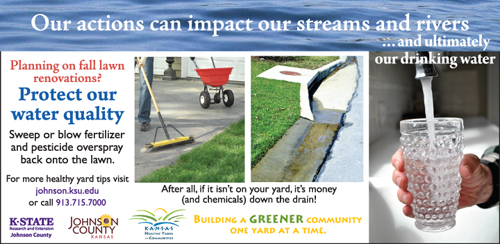Your Yard and Water Quality

Water is our greatest natural resource, not petroleum. We can live without oil, but if we pollute or destroy our water supply, quite frankly, we are doomed. Each of us can do some simple things to help ensure a continued supply of clean water. Let’s look as some practices that can help protect our water quality.
Think first before you apply
One of the simplest ways to become greener is to think before you act. Many pesticides and fertilizers are safe for the environment, but it is human error that creates the problem. By properly using and cleaning up after an application most of the potential hazard to the environment is all but eliminated. It is not a lot of work, or expensive, to ensure that the pesticides and fertilizers stay put and out of the water. Think of it this way, anything that leaves your property goes directly to the local rivers and streams via the gutters and storm drains. Remember, rainwater is not treated water.
When using pesticides the most important consideration happens before the application. Stop and think whether it is even needed. Many problems do not require the use of chemicals. Identify the problem and research all options. Consider the use of chemicals as the last resort. Many lawn and garden problems can be overcome by proper cultural practices such as proper mowing, watering and fertilizing. When cultural practices fail, then chemicals may be necessary.
Choose the right product and apply at the correct time of the year
If it is determined that pesticides are a must, make sure that you choose the proper product for the job at hand. Selecting the wrong product or applying it at the incorrect time is a total waste of time, energy and money, and places chemicals into the environment unnecessarily. Once the correct pesticide is chosen, apply it properly. Read the label and follow the instructions. The misapplication of products is how particles escape into the waterways. The most common causes of this are granular products that miss the lawn area and land on hard surfaces such as walks, drives or in the gutter. When it rains, the chemicals and fertilizers are easily washed into the storm sewers and into local streams.
Keep products off of hard surfaces
The easiest way to protect our water quality is by sweeping or blowing fertilizer and granular products off all hard surfaces back onto the lawn. Research has shown that a lawn is like a sponge. Once the chemical is applied, the grass blades and thatch layer catch and hold the chemical with little movement.
Extra precautions should also be taken in landscapes and lawns that are directly adjacent to water sources. The best way to do this is to create a buffer strip. A buffer strip is an area about 10 feet wide where no chemicals are applied. When rain arrives, this gives an added area for the runoff to be absorbed into the soil before reaching the water. This simple act can go a long way in reducing the algae problem in local subdivision ponds.
These are just a couple of easy practices that can help protect our supply of fresh water and still help build a greener lawn and garden.
Other Resources:
- Fall is the Time to Control Broadleaf Weeds
- Fertilize Kansas City Cool Season Lawns in September and November
Dennis Patton, Horticulture Agent
Have questions?
The Garden Hotline is staffed by trained EMG volunteers and Extension staff who will assist you with questions.
Phone: (913) 715-7050
Email: garden.help@jocogov.org